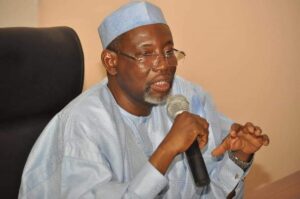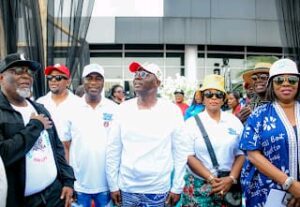Bodija explosion: Makinde receives official report, 3 suspects identified for prosecution
Gov. Seyi Makinde of Oyo State has received the official report of the Jan. 16, explosion that occurred at Adeyi Avenue in Bodija, Ibadan, in which five persons died.
The Special Adviser to the Governor on Security, Mr Fatai Owoseni, made this known on Wednesday while briefing newsmen shortly after the presentation of the report to the governor.
Owoseni said that three persons of interest have been identified in connection with the cause of the unfortunate incident.
He added that the identified persons will face prosecution based on the investigation carried out.
Owoseni also revealed that the character of the explosive is known as ‘Water Gel Type Based Explosive’ and that the explosion was triggered by an electric spark.
He explained that a Closed Circuit Television in one of the affected houses gave footage of how the incident happened.
Owoseni, the former Commissioner of Police in Lagos State, assured that the state government would bring the perpetrators to book.
He added that the government would also check the immigration status of all the people of interest since majority of the suspects quizzed were from Mali.
“We have been able to report that the swiftness with which security was deployed to the epicentre had so far successfully made the state to fully secure the environment.
“And with the security that was provided, the state has also been able to prevent untoward happenings, especially opportunistic crimes that hoodlums always take advantage of such situations to carry out.
“We would recall that an emergency situation centre was put in place by the governor, and was located at the premises of Oyo State Housing Corporation, Ibadan.
“The EOC has so far collated information, data of things that happened there and some of the data collated include census of the respective houses and the fatalities that were affected including the extent of losses suffered.
“As of 6 p.m, Feb 3, which was the 18th day of the incident, a total of 335 affected persons registered at the emergency situation centre.
“These include 16 companies or business operators, churches, mosques, three schools and the UCH also approached the centre to report on their losses.
“The losses reported also include fatality, injuries of various degrees, damages ranging from total collapse and submerging of houses, houses that suffered collateral damage and the ones that suffered minimal damages,” Owoseni stated.
The chairman, Nigeria Institute of Structural Engineers, Mr Mbim Okutinyang, who is also the lead coordinator of the team that carried out structural integrity on the affected houses, also told newsmen that 282 houses were affected.
He however said that only four of the houses would have to be demolished due to the degrees of the damage.
Okutinyang added that the seismic report was still being awaited.
On his part, the Head of the Emergency Operation Centre, Prof. Temitope Alonge, said 80 victims in total were managed across various hospitals following the incident, but only five patients were on admission as of the time of the press briefing.
Alonge explained that four of the patients are being treated at the University College Hospital (UCH) and were at various levels of recovery, while one patient is at the Redeemers Hospital being managed for a spinal cord injury.
He said that most of the cases at UCH will likely be discharged within the next one week.
The head of the EOC added that some of the affected victims that experienced medical disorder such as respiratory illness had been treated.
He also explained that those with symptoms suggestive of Post Traumatic Stress Disorder were being attended to by clinical psychologists from UCH.
Giving an update on the tests for radioactivity, Alonge said the site of the incident had been cleared in terms of radioactivity, as the EOC invited the Nigerian Nuclear Regulatory Agency (NNRA) to conduct another screening.




